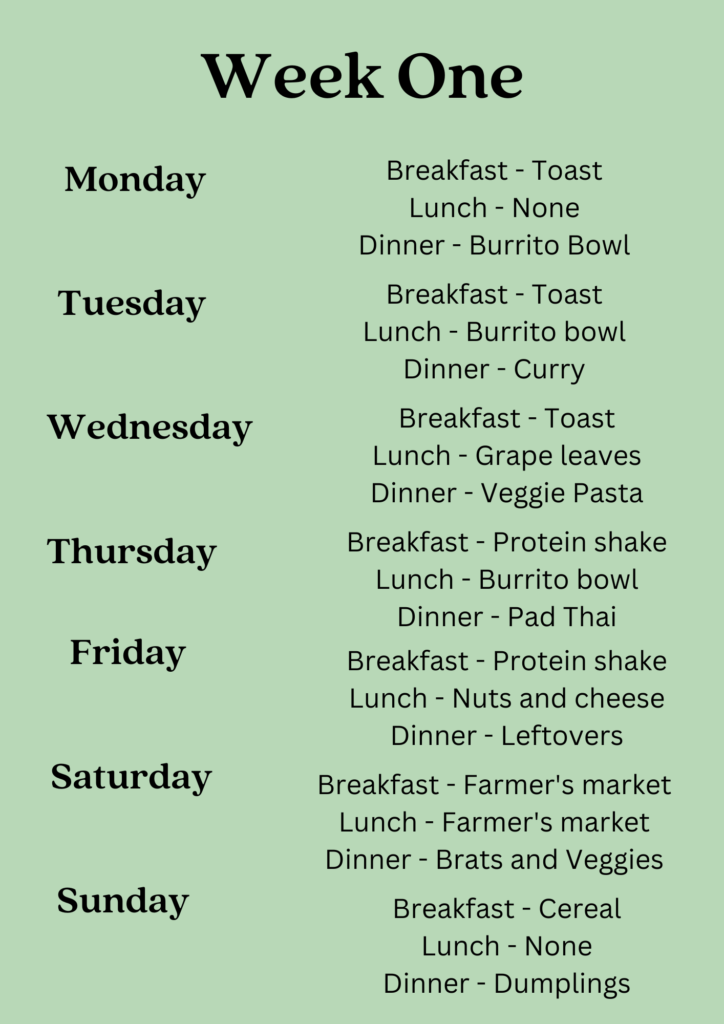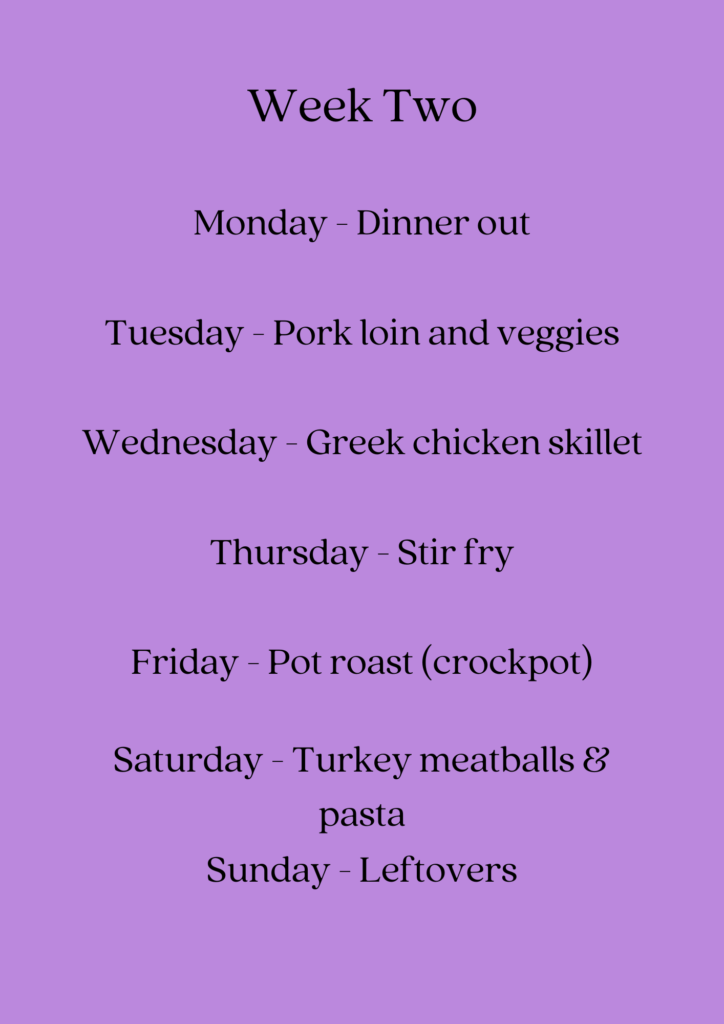Why is choosing what to have for dinner so difficult? This is one of the hidden scourges of adulthood – making a meal plan. Deciding what to eat every night is more exhausting than it has any right to be. After a long day of work, running errands, or taking care of others, nobody wants to stare at a half empty fridge and come up with dinner.
These are my tips for creating a meal plan that works for your household that will save you time, money, and a lot of decision fatigue.
Why Meal Plan?
Meal planning does require some time and mental energy. But trust me, it will save you so much in the long run. By planning your meals in advance, you can:
- Reduce trips to the grocery store
- Prepare ingredients ahead of time
- Accommodate for busy schedules or special occasions
- Include a variety of dishes
- Make healthier choices
- Include others in choosing meals
Life has a way of always being busy. I don’t like going to the grocery store on good days, let alone busy ones. By meal planning, I am able to make one trip to the store every week – two weeks, which saves me of hassle and time. I also find that I stick to my list better when I know all the meals I am shopping for. It is easy to go off the list if you only have a rough idea of what you might need, and end up spending more money.
For some extra busy weeks (or when I know I won’t want to spend a lot of time cooking in the week to come) I like to do some light meal prepping with my meal plan. After shopping, I take one night a week when I have more time and energy and I cut up all my veggies for the next few days, and make sure my protein is portioned out and thawing/marinating if necessary. This not only makes cooking that meal easier when it comes time, but it also helps ensure that I stick to my plan.
Be Realistic
Having a plan doesn’t mean you always need to eat at home. If your weekend is filled with events, write “dinner out” or “event” in your meal plan. Or if you have a long day where you can anticipate not wanting to cook, it’s okay to have a ramen or nuggets night. While it’s important to eat a balanced diet, simple is good. If all the meals on your plan require hours of cooking, you won’t want to follow your plan.
I usually have one day a week where we are not eating at home. The summer is always busy with bonfires and birthdays, so I know I won’t be cooking those days. Or, if I am preparing something to bring to the event, I put that on my meal plan. This also helps me organize my shopping list.
Use What You Have
This part may feel more tedious, but it is important. When creating a meal plan, look at ingredients that you already have. Cans of black beans in the pantry? Plan to make burrito bowls. Left over rice in the fridge? Fried rice it is. Finding ways to use or reuse ingredients you have will reduce waste and save money when you shop.
This is a good way to do a “big shop” once a month or so, and fill in fresh ingredients on other weeks. Lately, I have been really into beans and lentils. So when I notice I am out of these, I usually buy in bulk. These are ingredients that are shelf stable that I know I will use. Same goes for canned tomatoes, and longer lasting produce like carrots. It may take a bit of practice before you know what items these are for you. But once you find them – stock up!
What to Make?
What you choose to make can vary based on so many things. Dietary restrictions, goals, likes and dislikes, season, budget, time, the list could go on. I usually start with budget. What is the budget for the month, and how much does that give me per week? If you decide steaks were in the meal plan last week, adjust by making a low cost meal like a soup this week.
Next, what is your goal? Are you trying to lose weight? Gain muscle? Just find anything your family will eat? Use this to help inspire your recipe choices. For myself, my goal is to balance eating healthy with finding things my husband will also enjoy. Often I make large amounts of healthy dinners so I can eat leftovers for lunch. I know my husband won’t eat leftovers for lunch, so I plan to get bread for sandwiches.
Meal planning is also a good way to try a variety of cuisines. Make planning even easier by having repeating themes for different nights. If your family loves Mexican food, do a Mexican Monday or a Taco Tuesday. Try a Crockpot Sunday if that day is filled with other activities. Routine can be fun, and it gives you something to look forward to each week.
A Typical Week
Below are two different examples of real meal plans I have made. One includes breakfast, lunch, and dinner, while the other is just my dinners. When I was starting out, I found it helpful to plan all of my meals. This made tracking meals and knowing how much of certain ingredients I would need easier. I would also recommend this if you are planning with kids who need lunches and snacks.
My meal plans are based on my household’s schedules. My husband is gone until 9:30 on Tuesdays and Thursdays, which means I have extra time to cook on those days. I work later on Wednesdays and Fridays, so those are days when I want something easy. Mondays and Saturdays are my days off, which sometimes means I have lots of time. But other weeks it means I will spend all my energy running around.
Example Meal Plan Week 1

As shown in the week above, on my days off I don’t always make a specific lunch. Also, I usually have the same thing for breakfast. Because of this, I rarely plan out every meal like this. With just my husband and I, it’s easy enough to know what we will eat for our smaller meals. Again, this may or may not be easier depending on who is in your household. Next is my normal way of meal planning.
Example Meal Plan Week 2

When planning out my meals, I usually write them right in my planner. This way I can see any special occasions or long work days that should be taken into account. It also allows me to flip back through my planner to see how often I have used a certain recipe. Sometimes I will look back and see that I haven’t made a ground beef dish in a few weeks, so I will add that to the plan for this week. Furthermore, if I am making Asian dishes twice a week for a few weeks, maybe I will hold off for this week.
Final Thoughts
Meal planning will need to be adapted for your household and meal requirements. Think about what you would like to eat, and when it would work for you to make it. If you make something again and again, make note to keep it in rotation. Allow yourself time to plan, then ask for input from others in your home. Once your family gets thinking about what they might enjoy, it gets easier to include them in planning.
Allow yourself occasional days out, and to move plans to other days as needed. Sometimes you would rather have pasta on the weekend instead of when you had planned, and that’s fine. Since the plan is just for you, it doesn’t have to be perfect. You can simultaneously use meal planning as a outline and a guide.
Share Your Thoughts!
Please let me know what tips were helpful for you! When do you find meal planning helpful? How do you remember meals you want to make again? Which tricks do you still use to help and guide you?
